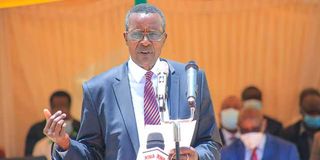Plan to recruit Maraga’s successor hits brick wall

Chief Justice David Maraga at a past event. He will proceed on terminal leave on December 15 pending his retirement on January 12 next year.
What you need to know:
- The CJ will be proceeding for his terminal leave on December 15 and eventually retire on January 12, 2021 after attaining 70 years.
- The continued stay of Mr Maraga means that the Judiciary may stay without a substantive CJ for at least six months, thanks to a lacuna in law.
The Judicial Service Commission (JSC) has disagreed on a proposal to begin the process of recruiting Chief Justice David Maraga’s successor before he exits.
A source within the commission who sought anonymity said the commissioners who held a meeting on Monday disagreed on the recommendation fronted to ensure a seamless transition when Mr Maraga leaves office.
The agenda was discussions to declare Mr Maraga’s position vacant and kick-start the process of finding his successor.
But the proposal flopped as four commissioners reportedly declined to approve it.
The CJ will be proceeding for his terminal leave on December 15 and eventually retire on January 12, 2021 after attaining 70 years.
The continued stay of Mr Maraga means that the Judiciary may stay without a substantive CJ for at least six months, thanks to a lacuna in law.
There is no law that guides the recruitment of a Chief Justice while the incumbent is still in office, which has derailed the process of determining the next CJ.
Mr Maraga’s deputy Philomena Mwilu, who is facing an ouster petition due to claims of misconduct, is likely to be the acting CJ for an indefinite period.
Monday’s meeting was held virtually due to the Covid-19 pandemic and it happened after an earlier meeting scheduled for October 16 aborted.
A sub-committee formed last month to provide a roadmap on the hiring of the next CJ wanted the commission to commence the recruitment so that when Mr Maraga retires, the exercise to pick his successor will be at an advanced stage.
The proposal met resistance following the disagreement among the commissioners.
“Early recruitment is not a replacement (of the incumbent CJ). Advertising and starting the process is not putting him (the appointee) in office. It is not a big issue. The process may take up to six months,” said the source.
JSC on September 16 resolved to appoint a sub-committee tasked with coming up with the road map for recruiting the CJ and transitional arrangements.
Recruitment
It comprised JSC Vice-Chairman Mercy Deche, Justice Mohammed Warsame, Justice David Majanja, Elizabeth Ominde and lawyer Macharia Njeru.
It also co-opted Mr Patrick Gichohi on account of his long public service in Parliament as clerk of National Assembly and as a commissioner at the Public Service Commission.
The committee recommended to the full commission the immediate commencement of the recruitment of the next CJ, including advertising the position.
On September 30, the sub-committee presented its report to the full commission, but its recommendation for commencement of the recruitment was opposed by three members of the JSC.
In opposing the proposal, they argued that it would be illegal to recruit a new CJ while Mr Maraga is still in office. According to Section 30 of Judicial Service Act, as read together with the First Schedule, the position of the office of the CJ cannot be advertised until it falls vacant.
The position becomes vacant once the office holder resigns, dies, retires or attains the age of 70. A bill by Kangema MP Muturi Kigano, which is pending before Parliament, seeks to amend section 30 of Judicial Service Act to empower JSC to start the recruitment process of a new office holder at least six months before the mandate of the Chief Justice ends.
“It is apparent that the JSC can foresee the arising of a vacancy in the Office of the Chief Justice and commence the recruitment process before the date of the actual occurrence of the vacancy,” the bill reads.
“In this respect, the Bill seeks to codify the best practice in democratic jurisdictions where there is an understanding that critical constitutional offices like that of the CJ and chairperson of the IEBC should not remain vacant for a long period,” the bill reads.





